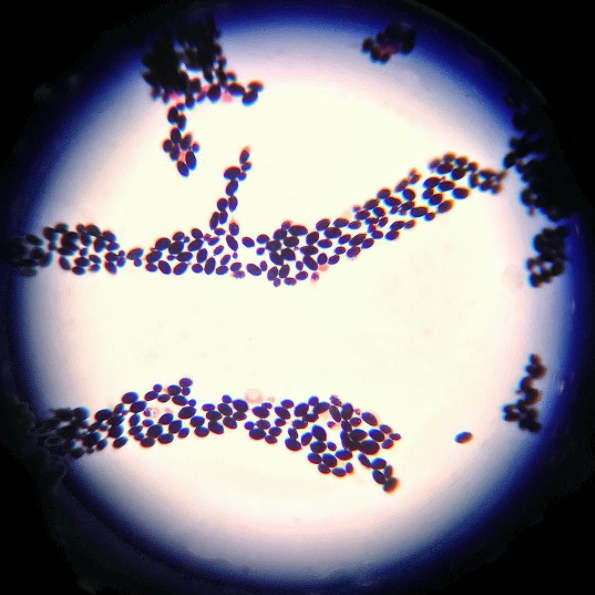We’ve all heard how healthy probiotics can be for you — but what exactly are they? We’ve got answers for all of your probiotic-related questions. Here’s everything you ever wanted to know about probiotics and their benefits.

Closeup on the Leuconostoc Cremoris bacteria, a live and active probiotic strain found in our kefir. Thanks to dietetic student Hilda Zvizdich for capturing this image while researching the vitality of Lifeway’s bacterial strains.
What are probiotics?
Probiotics are “good” bacteria. They are live microorganisms similar to the ones already living in your gut and may offer health benefits when consumed in adequate amounts.
The word “probiotic” itself is often translated to “beneficial for life.” It is a derived from the Latin word “pro” meaning “for” and the Greek word “biotic” meaning “life.”
Breaking down the “microbiome”
The microbiome consists of microbes, or microorganisms, that live and colonize on everything from people, plants, the soil, animals, the oceans, etc. These microorganisms can affect us negatively like those nasty viruses that get you sick, but they can also be beneficial, like the probiotics found in kefir.
The human microbiome has many functions, such as helping us absorb nutrients from our food and protecting us against pathogens.
What do probiotics do?
Probiotics can help balance the microbiome by replenishing the good bacteria, which may lead to improved digestion and better immunity.
How many probiotics do I need to take?
While the FDA does not list a recommended amount of daily probiotic intake, studies have shown that about 1-10 billion CFU daily is recommended for healthy individuals. Of course, we always recommend that you talk to your doctor about your specific needs.
What is a colony-forming unit?
CFU stands for “Colony-Forming Unit” which is the total number of bacteria in probiotics that are capable of dividing and forming colonies.
So what are some of the benefits?
a. Combat health conditions and improve regular digestion
Those who suffer from an imbalanced gut microbiome or those who suffer from GI disorders may find relief after consuming probiotics (more on this later).
b. Support a healthy gut-brain axis
We’ve discussed before how our brain and gut communicate with each other. Scientists previously thought there was a one-way communication between the brain and the gut, but now realize that it’s a two-way line. Basically, your gut, which is comprised of millions of neurons called the enteric nervous system, is also talking back to your brain.
On top of alerting your immune system to foreign invaders, digesting and absorbing nutrients, your gut also produces serotonin. In fact, about 90% of the serotonin in your body is produced by the cells in your gut.
c. Support immunity
The gut plays an integral role in protecting you against pathogens and viruses. Just as your skin protects you against foreign invaders on the outside, your gut lining protects you on the inside.
d. Enhance Athletic Performance
Athletes should pay special attention to their probiotic intake. To perform their best, athletes typically require higher nutrient absorption. Things like inflammation and immune-function may affect their day-to-day more than those who don’t require their physical-prowess to be at tip-top shape.
Probiotics may increase antioxidant, protein, and fat absorption. They may also promote higher levels of interferon which is a “natural virus fighter [that is sometimes] decreased in fatigued athletes.”
To learn more about probiotics and athletic performance, there’s an excellent article at Active.com that sums up the benefits.
e. Break down lactose
According to the Midwest Dairy Association, “lactose intolerance is a gastrointestinal disturbance following the consumption of an amount of lactose greater than can be digested and absorbed by the body.”
Those who are lactose intolerant often find our kefir easy to digest. This is because the live and active probiotic cultures in kefir help break down the lactose, so your body doesn’t have to.
If you want more information, we have a whole post dedicated to lactose intolerance and our kefir.
So, how does the gut get out of balance?
Many factors can throw your gut out of balance. For example, things like
• Taking antibiotics
• Stress
• Kidney stones
• Lack of sleep
• Surgeries and procedures like colostomies
Those with Gastrointestinal (GI) disorders such as
• IBS
• UTIs
• Diarrhea
• Heartburn
• Constipation
• Crohn’s Disease
And, maybe the least surprising of all, eating an unhealthy diet full of processed foods can lead to an imbalanced microbiome.
Where do I get probiotics?
We recommend getting probiotics from foods that are naturally rich in good bacteria which are more easily digested and absorbed than supplements or foods that contain added probiotics. Furthermore, fermented and cultured foods may also have added health benefits (such as prebiotics) that can help incorporate and utilize the probiotics in your gut.
What are some examples of probiotic-rich foods?
Naturally fermented foods, like kefir, aged cheeses, sauerkraut, kimchi, tempeh, and soy products such as miso are known to have probiotic cultures.
Each 8oz serving of drinkable Lifeway Kefir has 12 live and active cultures with 25-30 billion CFUs.
While we believe in the power of probiotics and their myriad benefits, we strongly encourage you to talk to your healthcare provider or dietitian to find the right diet and exercise regimen for you.